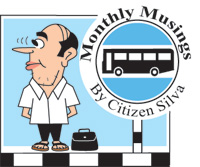Sunday Times 2
The hybrid court shame!
View(s):One of the advantages of this country having a foreign minister who was educated at Oxford University (unlike a foreign minister whose sole tertiary qualification is in Clothing Design and Technology from St Martin’s School of Art) is that Professor G.L. Peiris would have understood perfectly well the meaning of the word ‘HYBRID’.
The Oxford English dictionary clearly defines the word HYBRID (when used as an adjective) thus: ‘of mixed character; composed of different elements’. So I was interested to hear Foreign Minister Mangala Samaraweera at his recent media brief telling us about the “consensual report’ that had been agreed upon by the Government of Sri Lanka and the United Nations Human Rights Council (UNHRC) — and then trying to explain about this “Hybrid Special Court” that he and his Government had agreed to have foisted upon us.
 The last time I read about a “Hybrid Court” was in April this year – in a report from the Central African Republic (the landlocked and impoverished country north of the Congo in the middle of Africa).
The last time I read about a “Hybrid Court” was in April this year – in a report from the Central African Republic (the landlocked and impoverished country north of the Congo in the middle of Africa).
That nation’s parliament had voted by an overwhelming majority to set up a Hybrid Court to investigate and prosecute those responsible for war crimes during the country’s civil war.
Now the Central African Republic is a country — among the ten poorest in the world –where violent fighting has been going on since 2004 between Muslim and Christian factions and the government, and where armed groups still operate. It has been subject to terrible ethnic and religious cleansing as well as massive population displacement.
The Central African authorities have repeatedly admitted the weaknesses of their national justice system, admitting that they lack the manpower, material resources, and expertise to handle difficult investigations into complex crimes. The report I read stated that the country’s legislature was going to enact a law to set up a ‘Hybrid Court’ with Central African and international judges; the court was to have a Central African president and an international special prosecutor.
Listening to Mangala’s blustering words I remembered what I read about the Central African Republic — and I had to ask myself: Are we in Sri Lanka in the same boat as the Central African Republic? Are we as a nation so devoid of competent legal professionals, so lacking in a system of justice, as to require foreign judges, prosecutors, defence lawyers and investigators to deal with alleged war crimes and human rights violations in our own country?
Of course, there are vested interests like the US based Human Rights Watch and Amnesty International to want to poke their fingers into our country. Item 3 of the UNHRC report (Mangala’s famous “consensual report”) even recommends that our government invite the UNHRC to establish a full-fledged country presence here so they could monitor us!
The report also recommends that members of our security forces if they are suspected of being involved in human rights violations or crimes, should be suspended until an investigation is completed. In other words, the members of our armed forces are guilty until proved otherwise!
For 23 years our country suffered due to the actions of a brutal terrorist group — a group that was proscribed as ‘Specially Designated Terrorist’ by the US since 2001 and by the UK under that country’s Terrorism Act as a ‘Proscribed Terrorist Group’ since 2000.
The armed forces of our country valiantly fought (with much greater success than the Americans and British have done against the terrorist groups that they have taken on) and defeated this Terrorist Group who held the citizens of our nation in a grip of terror, violating our rights as human beings to live in peace in our own country.
At the last UNHRC meeting, the permanent Representative of Pakistan, Ambassador Zameer Akram said: “We believe that after the end of the struggle against terrorism, the people of Sri Lanka deserve the support and assistance of the international community to rebuild the country. Those who have been critical of Sri Lanka’s efforts to overcome terrorism and separatism funded from abroad would do well to look at their own track record on the so-called war on terror.”
It is pertinent to note that around the time of the US ‘consensually’ bringing their resolution against Sri Lanka at the UNHRC, a US Air Force AC-130 bomber had bombed a civilian hospital in the Afghan city of Kunduz, killing many civilians including doctors and nurses and patients.
When speaking to reporters afterwards, US General John Campbell admitted (sic) “several civilians were accidentally struck” – and criticised the Taliban for fighting from urban areas and putting civilians at risk!
Some countries wage a war against terrorists, defeat the terrorists and make their country safe for its citizens.
Other countries wage wars against terrorists, drop bombs on hospitals, still cannot defeat the terrorists – and then try to bully small countries like ours with resolutions and hybrid courts. Where was the US when we needed help in our own war against terrorism?
Are we today being asked to abandon the heroic members of our armed forces to hybrid kangaroo courts?
I recall Rudyard Kipling’s famous poem written in defence of the ordinary British soldier:
“For its Tommy this, an’ Tommy that, an’ “Chuck him out, the brute!”
But it’s “Saviour of ‘is country” when the guns begin to shoot!”

